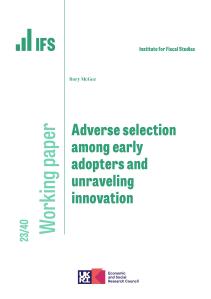Random utility models are widely used to study consumer choice. The vast majority of applications assume utility is linear in consumption of the outside good, which imposes that total expenditure on the subset of goods of interest does not affect demand for inside goods and restricts demand curvature and passthrough. We show that relaxing these restrictions can be important, particularly if one is interested in the distributional effects of a policy change, even in a market for a small budget share product category. We consider the use of tax policy to lower fat consumption and show that a specific (per unit) tax results in larger reductions than an ad valorem tax, but at greater cost to consumers.
Authors

CPP Co-Director, IFS Research Director
Rachel is Research Director and Professor at the University of Manchester. She was made a Dame for services to economic policy and education in 2021.

cemmap co-Director University College London
Lars Nesheim is a Professor of Economics at UCL and Co-Director of the Centre for Microdata Methods and Practice (cemmap).

Research Fellow University of Wisconsin
Martin, previously Deputy Research Director, is a Research Fellow at IFS and Professor of Economics at the University of Wisconsin.
Journal article details
- DOI
- 10.3982/QE583
- Publisher
- Wiley
- Issue
- November 2017
Suggested citation
R, Griffith and L, Nesheim and M, O'Connell. (2017). 'Income effects and the welfare consequences of tax in differentiated product oligopoly' (2017)
Grant
More from IFS
Understand this issue

Spring Budget 2024: the Chancellor’s options

Spring Budget 2024: What you need to know
7 March 2024

Scottish Budget 2024-25: IFS analysis
Policy analysis

Spring Budget 2024
6 March 2024

Reforming the taxation of non-doms: policy options and uncertainties
4 March 2024

The IFS Scottish Budget Report – 2024–25
22 February 2024
Academic research

Saving by buying ahead: stockpiling in response to lump-sum payments
2 February 2024

Intertemporal income shifting and the taxation of business owner-managers
24 January 2024

Adverse selection among early adopters and unraveling innovation
18 December 2023